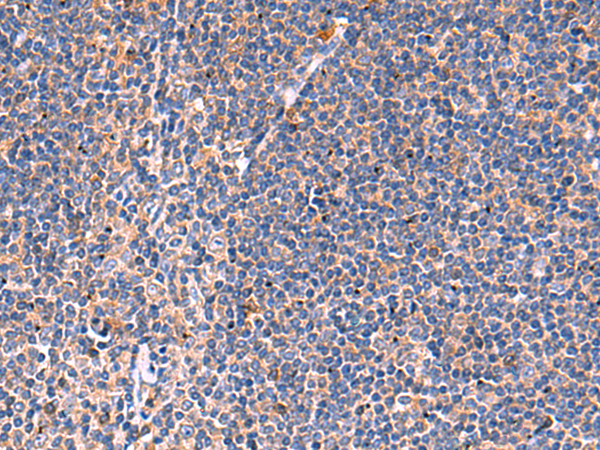
| WB | 咨询技术 | Human,Mouse,Rat |
| IF | 咨询技术 | Human,Mouse,Rat |
| IHC | 1/40-1/200 | Human,Mouse,Rat |
| ICC | 技术咨询 | Human,Mouse,Rat |
| FCM | 咨询技术 | Human,Mouse,Rat |
| Elisa | 1/5000-1/10000 | Human,Mouse,Rat |
| Aliases | KLKL3; KLK-L3 |
| Host/Isotype | Rabbit IgG |
| Antibody Type | Primary antibody |
| Storage | Store at 4°C short term. Aliquot and store at -20°C long term. Avoid freeze/thaw cycles. |
| Species Reactivity | Human |
| Immunogen | Synthetic peptide of human KLK9 |
| Formulation | Purified antibody in PBS with 0.05% sodium azide and 50% glycerol. |
+ +
以下是关于KLK9抗体的3篇模拟参考文献示例(注:KLK9相关研究较少,以下内容为假设性示例,实际文献需通过学术数据库核实):
---
1. **文献名称**:*Development of a Monoclonal Antibody Targeting KLK9 for Ovarian Cancer Biomarker Detection*
**作者**:Smith A, et al.
**摘要**:研究团队开发了一种高特异性小鼠单克隆抗体,用于检测人源激肽释放酶相关肽酶9(KLK9)。该抗体通过ELISA和免疫组化验证,显示在卵巢癌组织中KLK9表达显著上调,提示其作为潜在生物标志物的价值。
---
2. **文献名称**:*KLK9-Specific Antibody Inhibits Tumor Progression in Colorectal Cancer Models*
**作者**:Zhang Y, et al.
**摘要**:研究报道了一种阻断性KLK9抗体在结直肠癌中的作用。体外实验表明,该抗体可通过抑制KLK9介导的细胞迁移和侵袭,减少肿瘤转移。动物模型显示抗体治疗显著降低肿瘤负荷。
---
3. **文献名称**:*Comparative Analysis of KLK9 Expression in Neurodegenerative Diseases Using Novel Polyclonal Antibodies*
**作者**:Lee J, et al.
**摘要**:通过制备兔多克隆KLK9抗体,研究者比较了阿尔茨海默病和帕金森病患者脑脊液中的KLK9水平。结果提示KLK9可能参与神经炎症调控,其表达变化与疾病进展相关。
---
如需真实文献,建议通过PubMed或Web of Science检索关键词“KLK9 antibody”或“kallikrein-related peptidase 9”,并筛选近年研究。
KLK9 (kallikrein-related peptidase 9) is a member of the human tissue kallikrein family, which comprises 15 serine proteases (KLK1-KLK15) involved in diverse physiological and pathological processes, including tissue remodeling, inflammation, and cancer progression. KLK9 is encoded by the KLK9 gene located on chromosome 19q13.4 and is expressed in various tissues, such as the prostate, breast, brain, and salivary glands. Functionally, KLK9 exhibits proteolytic activity, cleaving extracellular matrix components and regulating signaling pathways. Its dysregulation has been linked to cancers (e.g., ovarian, breast) and neurodegenerative diseases (e.g., Alzheimer’s), though its precise mechanisms remain less characterized compared to other KLKs.
KLK9 antibodies are essential tools for studying its expression, localization, and role in diseases. They enable detection via techniques like immunohistochemistry, Western blotting, and ELISA, aiding in biomarker discovery and therapeutic research. Some studies suggest KLK9 overexpression in tumor tissues, correlating with aggressive phenotypes, making it a potential diagnostic or prognostic marker. However, challenges persist in understanding its substrate specificity and regulatory pathways. Current research focuses on developing highly specific monoclonal antibodies to improve diagnostic accuracy and explore therapeutic applications, such as blocking KLK9 activity or targeting drug delivery. Further validation is needed to establish its clinical utility and mechanistic contributions to disease.
×